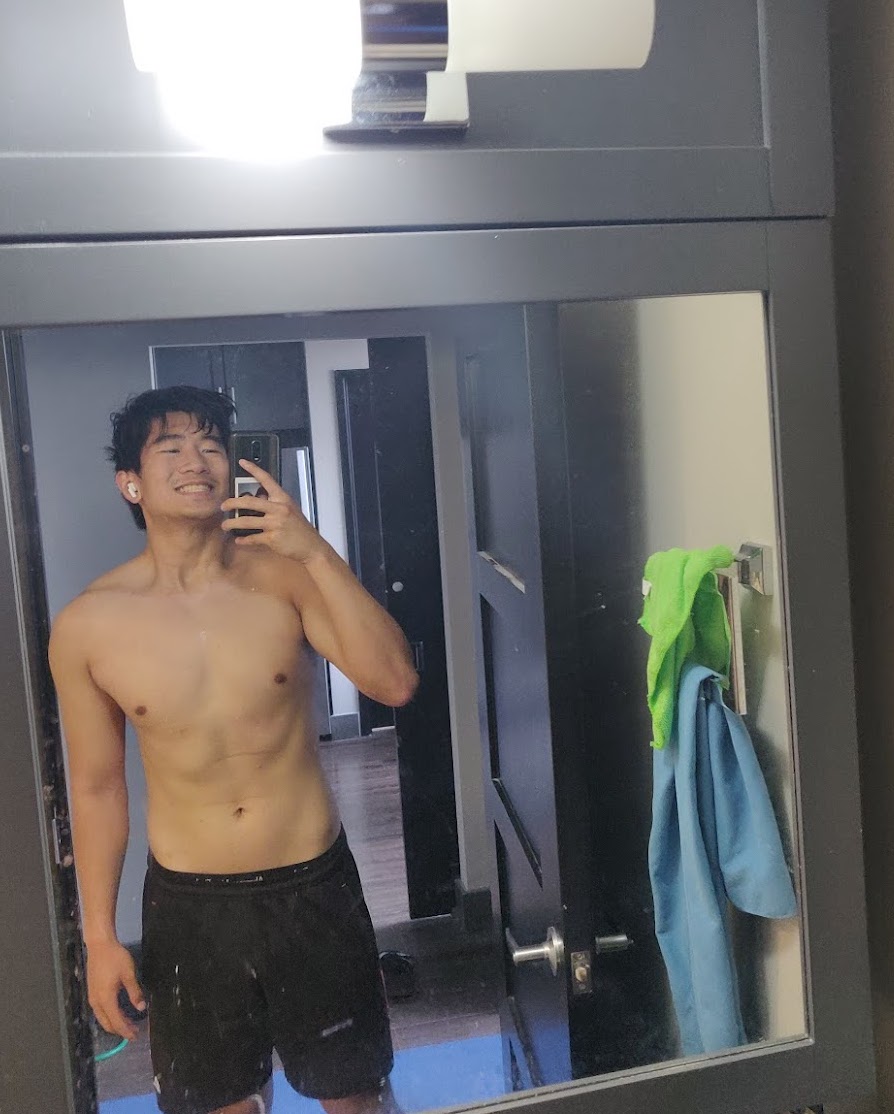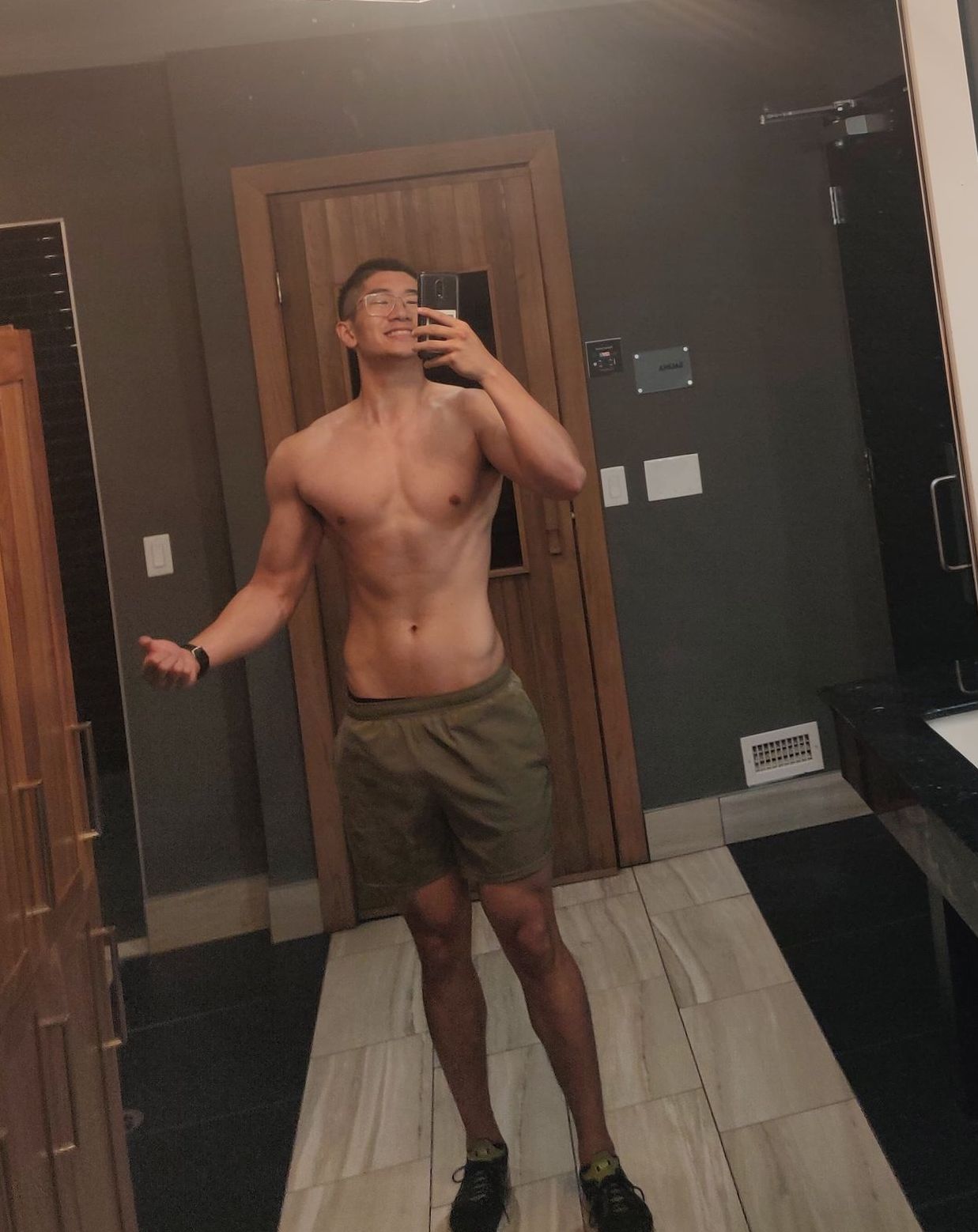The best decision I've made
May 18th, 2022
Context
In May of 2021, I decided to make a change. I had spent the last few months mostly sedentary, blaming my lack of physical activity on Doug Ford locking down the gyms. The depressing Waterloo winter combined with a stressful time at my internship had turned me into a literal potato. Over the course of 4 months, I had gained over 20 pounds of excess weight and felt dreadful – activities that I had previously enjoyed like running or basketball were becoming increasingly difficult and less fun.
This stretch of time was marred with body dysmorphia, self-hate, and fear. In high school, playing sports year-round had always kept me fit and well-conditioned, constantly boosting my energy and confidence. I detested the way I “let myself go” and began becoming incessantly angry at myself, hoping I’d bully myself into doing better. Unsurprisingly, this toxic mindset proved to be ridiculously unproductive.
I didn’t really have a specific turning point, but I somehow started dragging myself out of the house for short jogs and exercises – I’d run from my apartment to the local park and do some push ups against the benches. Gradually, this became part of my daily routine. Instead of firing up league of legends right after work, I’d get a solid 45 minutes of exercise in. After several weeks of this, the gyms reopened, and I started integrating trips to the University gym with my daily work schedule. In the year that’s passed since then, these workouts have grown into a quintessential part of my life. I’m now lifting 5-6 days a week and doing some form of physical activity every single day. Always prioritizing my health has been an interesting journey, and I’m excited to share some lessons from along the way.


How it started vs. how it's going :) (May 2021 vs. May 2022)
Lessons
-
Have clear goals
I started exercising just for the sake of exercising. Don’t get me wrong, this is better than nothing, but it’s far from a solid approach. Take some time to think about what you want to accomplish. Whether it’s losing excess fat, developing athletic performance, or getting fit enough to hike Half Dome during your next Cali internship, having concrete goals is essential. What does your ideal body look and feel like? For me personally, I wanted to develop a more muscular & aesthetic physique but also build strength and athleticism at the same time. I recommend starting with some benchmarking – observe your height, weight, and physique, but also take notes on how your body feels after some basic physical movements (a short jog, some push ups, or other exercises). This benchmark will serve as your starting point – seeing your progress from where you started is a huge motivator that’ll keep you going!
-
Do your research
Now that your goals are established, literally take 10 minutes to get a baseline understanding of how to achieve them. Speak to a gym attendant (they’re almost always friendly and knowledgeable), a friend (I volunteer as tribute :) ), or do a cursory google search for some popular sources of knowledge. These are some of my favorites:
- JPGCoaching (best source of bodybuilding tips and tricks)
- Roger Huyhn (information about weightlifting, powerlifting, and nutrition from an Asian perspective)
- Knees Over Toes Guy(developing flexibility and strength to make your body more functional in daily life)
- ProfessionalWeakGuy & OliviaJGraham (brother & sister powerlifting duo who might inspire you to deadlift!)
- Reddit – I’ve found that r/startingstrength, r/getshredded, r/running, and r/fitness are great communities in general.
- Derek MPMD (supplements, fitness entertainment, and interesting podcasts)
You don’t need to spend long here. Like I said, 10 minutes of scrolling through “first day at the gym” on TikTok or YouTube will work wonders.
-
Work with a buddy/support system
I’m surprised that I didn’t quickly lose interest initially without a gym buddy. Let’s be real, the actual concept of working out is lame. You’re literally picking up heavy objects only to put them back down again. Being able to have someone to hold you accountable and work towards your goals with is severely underrated. I’m endlessly grateful for my meathead roommates and classmates who make the gym a fun social environment too. I recommend making a schedule with these buddies – whether it’s once, twice, or six days a week, having a consistent slot will keep you coming back.
-
Nutrition is king
This point should honestly be number 1 but it wouldn’t make sense without context. The biggest reason why people don’t progress in fitness is nutrition. Managing your weight is ultimately a simple question: how does the calories you’re consuming compare to the calories you’re burning? Everyone has a “maintenance caloric intake” – the amount they eat on a regular day that keeps their body composition the same. I would start by tracking what you eat in a regular week on an app like MyFitnessPal. Don’t try to fudge any numbers or modify your diet – be completely honest with yourself. From there, add or subtract a few hundred a day and you’re well on your way. I personally love food and shudder at the idea of not being able to eat yummy things while trying to achieve my fitness goals. Although it’s true that many of our favorite student foods (Ramen, Pizza, Shawarma, etc.) are unhealthy for various reasons, at the end of the day it’s all about portion control. During my final week of cutting weight this semester, I literally ate Lazeez three times in 8 meals. Replacing that box of carbs and sauce with sweet potatoes and chicken breast would be far better for you, but I can anecdotally assure you that it’s more than possible to achieve your goals like this.
After figuring out your caloric intake, you can start considering your macronutrient consumption to optimize your diet. The 3 key “macros” are carbohydrates, fat, and protein. MyFitnessPal (or similar applications) helps you establish targets for each of these core nutrients and meeting them consistently will speed up your progress.
I’ve personally struggled with staying disciplined in hitting these targets every single day. That's okay. Indulging in a cheat meal or two (or many) may be slowing you down, but the compounded outcome all your positive actions will ultimately pull through. Don’t beat yourself up over little losses, keep your chin up and let your habits carry you!
-
You don’t necessarily need a gym
You can easily have a full-body workout and strength-building routine without any weights and equipment. The pandemic has taught us to be resourceful in many ways, especially in home workout setups. I started doing push-ups, squats, and pull-ups in between zoom meetings and lectures, which proved to be a great strategy to avoid screen fatigue. If you squeeze in 20 push-ups between each lecture, you can easily hit 100 a day – the amount prescribed to Marine Corps recruits. Just like nutrition, tiny habits like this go a long way.
-
Don’t forget your warmups, cardio, and mobility
Injuries suck. Not only do they prevent you from exercising, but they could also severely mess up your quality of life down the road, especially if you’re already a grown adult. Stretching properly and warming your heart rate up are some of the most ignored habits. Taking 5 minutes of your day to just making sure your joints are moving correctly can save you a lot of pain in the future. I personally force myself to warm up for at least 2 full songs on my playlist before I move to a working weight. In addition, dedicating time after a workout to do mobility stretches and different recovery techniques is also a game changer. Icing/massaging sore muscles, getting full range of motion in your joints, or even just walking to cool down can boost your performance for your next workout.
-
Consistency is more important than optimization
A big mistake is worrying about whether each exercise or workout is “perfectly optimal”. I would sometimes skip exercises because someone would say it wasn’t optimal or even skip workouts because I wouldn’t have enough time to get through all my sets. My takeaway here is to always prioritize consistency over optimization. A suboptimal workout is better than no workout at all! I recommend looking to optimize individual movements as you get comfortable with a program or workout schedule. Having to worry about optimization when you’re still trying to build the discipline and confidence to keep coming back to the gym is just overkill.
-
(Most) Supplements are Snake Oil
There are only 3 mainstream fitness supplements that are absolutely proven to work.
-
Protein
As stated above, one of the 3 essential macronutrients. Protein helps with muscle growth and tissue repair, hormone/enzyme generation, and nutritional needs. Something like Whey Protein powder can really help with hitting your caloric and macronutrient goals. When shopping for these supplements, I simply look for a cheap source of high-quality whey that has interesting flavors to keep things fresh. I’ve personally tried Revolution Nutrition and MyProtein, with both satisfying my needs quite well.
-
Creatine
The other muscle-building supplement is Creatine. It’s commonly found in red meat and seafood but is usually sold in a synthetic version (Creatine Monohydrate). The compound is proven to boost strength and muscle recovery speed, as it enables skeletal muscle fibres to absorb more water and boost ATP production. I would take 5g of creatine a day whenever I exercised, making sure to drink extra water to make up for the increased water absorption in my muscles.
-
Caffeine
Pre-workout supplements always include caffeine, the godly stimulant us university students consume at an ungodly rate. As a stimulant, caffeine keeps you alert and sharp, which helps in a workout. However, I would advise against regularly using pre-workout, as I’ve found it quite easy to slip into a caffeine addiction. I’ve previously tried Batch27 and Revolution Nutrition’s Bull Dose Rush, using them whenever I was feeling tired or preparing for a big workout.
That’s it. Protein, Creatine, and Caffeine are the only supplements you should really consider. Don’t bother wasting money on amino acids, Glutamine, Turkesterone, or whatever other shiny expensive bottle is pitched to you on Instagram. In an ideal world, everyone would be able to achieve their fitness goals without supplements, but the 3 listed above make overcoming genetic/lifestyle barriers just a tiny bit easier.
-
Protein
Closing Thoughts
Your physical health is closely tied with your mental well-being. I’ve become a strong believer in the idea that everyone needs an outlet for self-expression – examples include visual art, writing, music, dance, or in my case, independent sport. I find this particularly interesting because of how personal independent sports are. People often enjoy team sports like Frisbee or Basketball because of social aspects like collaboration or teamwork, but those are largely missing in an independent sport like weightlifting.
In each individual lifting session, your only competitor is really yourself. Can you beat yourself? Can you overcome your previous weaknesses? This feeling is truly cathartic and really helped clear my headspace. Sometimes, you’ll have a “perfect” lift – a moment where you’re completely in tune with your body and mind, dedicating every single bit of your energy to a single movement. Even though it lasts less than a minute, you feel innately human – so perfectly flawed. I think moments like this are what makes fitness a great outlet for self-expression. I’ve developed more mindfulness, patience, and care for my own body. With that, I can confidently that getting my ass to the gym was the best decision I’ve made. Maybe it could be a huge help for you too ;)
Hit up @tailaifit on Instagram :D
TW
